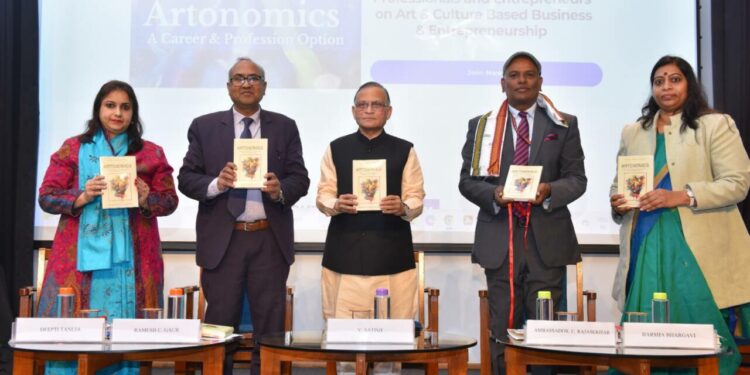Senior BJP leader V Satish emphasized the need to decolonise our mindset to become a developed and self-respecting nation. He was delivering keynote address after releasing a book, Artonomics: Blending Creativity, Technology and Entrepreneurship, authored by Dr Pandiri Harsha Bhargavi. The book was brought out by Indus Scrolls Press.
He lamented the historical tragedy of enduring foreign rule and invasion in the country for thousands of years, asserting that it has resulted in a loss of self-esteem as a nation. Referring to the Prime Minister’s speech during the pandemic and the emphasis on ‘Aatmnirbhar’ (self-sufficiency), he highlighted the importance of maintaining independence in the pursuit of knowledge and upholding the Indian knowledge tradition.
Shri Satish expressed concerns about colonial footprints and intellectual slavery, noting a tendency to question cultural development initiatives such as the ‘Kashi’ corridor or ‘Ujjain Mahakaal Lok Corridor.’ He acknowledged that some might argue for development in the health or education sectors instead, but he countered this view by asserting the multifaceted impact of these corridors, including positive influences on the economy and income generation. He stressed the necessity for holistic development in various sectors like agriculture, economy, infrastructure, and culture, rejecting the idea of singular development. He pinpointed a lingering issue—the tendency to view matters through the prism of colonial footprints. He dismissed the notion that engaging in a discourse on culture pertaining to economics is a departure from globalization, stating that it is baseless. He advocated for a shift in the thought process, urging the dissemination of everything based on native genius and encouraging a change in perspective.
The author, Dr. Pandiri Harsha Bhargavi, presented her work, delving into the intricate fusion of creativity, technology, and entrepreneurship in the realm of art. The book launch and discussion had the presence of distinguished speakers, including Ambassador C. Rajasekhar, IFS, OSD, States Division, Ministry of External Affairs, Government of India, Prof. (Dr.) Ramesh C. Gaur, Dean (Administration) and Head, Kala Nidhi Division, IGNCA and Prof. Deepti Taneja, Professor of Economics and Joint Dean of the Culture Council at the University of Delhi.
Ambassador C. Rajashekhar commenced by extending congratulations to the author for authoring a book that intertwines culture, economics, and art. He acknowledged the celebration of culture while pointing out that it often becomes a soft target for monetary grants. Shri Rajashekhar highlighted the significance of culture, stating that it defines who we are as a nation and underlining the principle of ‘Vasudhaiv Kutumbakam’—the belief that the world is one family. He expounded on the concept, describing the nation as ‘Vishva Mitr’ or a friend of the world. He further asserted the timely relevance of Dr. Bhargavi’s book, which draws attention to the intersection of art, culture, and economics. He highlighted the role of culture in instilling faith and its substantial impact on accelerating the economy. He concluded by stressing the necessity for significant political attention in the realm of culture and economics.
Prof. Deepti Taneja, addressing the book launch event, commended the choice of the term ‘Artonomics’ in the book’s title. She proposed the fusion of art and entrepreneurship as ‘artopreneur,’ emphasizing the current deficiencies in entrepreneurial and financial skills. Prof. Taneja asserted the necessity for blending creativity with economics, asserting that financial acumen, intellectual property rights (IPR), risk-taking ability, and entrepreneurship are critical factors for success in the art and culture domain intertwined with finance and the economy. She asserted that individuals in the art and culture sphere should possess a foundational understanding of economic principles. She outlined perseverance, patience, flexibility, and having a backup plan as essential attributes for those navigating the intersection of art, culture, finance, and the economy. Prof. Taneja’s insights highlighted the multifaceted skill set required for excellence in this dynamic field.
Dr. Harsha Bhargavi, discussing her book, emphasized its exploration of culture and economic diplomacy with an international perspective. She reiterated about the financial challenges facing artists, particularly in the performing arts, and stressed the need for innovative solutions leveraging technology for Cultural Rights, IPR, and Entrepreneurship in painting and sculpture and other performing arts. In conclusion, Dr. Bhargavi asserted the essential role of society in creating a dynamic ecosystem that supports the development and success of the art and culture sectors, enabling artists to pursue their creative goals.
In his welcome address, Prof. Gaur conveyed gratitude to the distinguished guests, speakers, and the audience, expressing contentment over the release of a book addressing such a pertinent subject. During his remarks at the event, he delved into the micro and macro aspects of the economy within the realm of art and culture. Prof. Gaur stressed the necessity for additional policy measures in the cultural field, elaborating on the significance of ‘GLAM’—galleries, libraries, archives, and museums—as institutions with a mission to provide access to knowledge, collecting and preserving cultural heritage materials for the public interest. The gathering provided a platform for an engaging exploration of the intersection between art, technology, and entrepreneurship, shedding light on the dynamic landscape where these realms converge.



















Discussion about this post